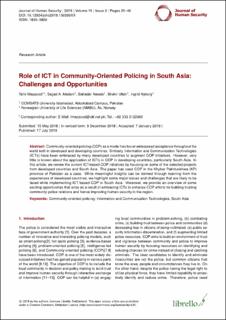| dc.contributor.author | Nyborg, Ingrid L. P. | |
| dc.contributor.author | Maqsood, Tahir | |
| dc.contributor.author | Madani, Sajjad A. | |
| dc.contributor.author | Ullah, Shakir | |
| dc.contributor.author | Nawab, Bahadar | |
| dc.date.accessioned | 2020-07-10T11:40:57Z | |
| dc.date.available | 2020-07-10T11:40:57Z | |
| dc.date.created | 2020-01-07T12:33:56Z | |
| dc.date.issued | 2019 | |
| dc.identifier.citation | Journal of Human Security (JHS). 2019, 15 (2), 21-40. | en_US |
| dc.identifier.issn | 1835-3800 | |
| dc.identifier.uri | https://hdl.handle.net/11250/2663700 | |
| dc.description.abstract | Community-orientedpolicing(COP)asamodelhasfoundwidespreadacceptancethroughoutthe world both in developed and developing countries. Similarly, Information and Communication Technologies (ICTs) have been embraced by many developed countries to augment COP initiatives. However, very little is known about the application of ICTs in COP in developing countries, particularly South Asia. In this article, we review the current ICT-based COP initiatives by focusing on some of the selected projects from developed countries and South Asia. The paper has used COP in the Khyber Pakhtunkhwa (KP) province of Pakistan as a case. While meaningful insights can be derived through learning from the experiences of developed countries, we highlight some major issues and challenges that are likely to be faced while implementing ICT based COP in South Asia. Moreover, we provide an overview of some exciting opportunities that arise as a result of embracing ICTs to enhance COP efforts for building trusting community-police relations and hence improving human security in the region. | en_US |
| dc.language.iso | eng | en_US |
| dc.rights | Navngivelse 4.0 Internasjonal | * |
| dc.rights.uri | http://creativecommons.org/licenses/by/4.0/deed.no | * |
| dc.title | Role of ICT in Community-Oriented Policing in South Asia: Challenges and Opportunities | en_US |
| dc.type | Peer reviewed | en_US |
| dc.type | Journal article | en_US |
| dc.description.version | publishedVersion | en_US |
| dc.source.pagenumber | 21-40 | en_US |
| dc.source.volume | 15 | en_US |
| dc.source.journal | Journal of Human Security (JHS) | en_US |
| dc.source.issue | 2 | en_US |
| dc.identifier.doi | 10.12924/johs2019.15020021 | |
| dc.identifier.cristin | 1767637 | |
| dc.relation.project | EC/H2020/ICT4COP | en_US |
| cristin.unitcode | 192,13,1,0 | |
| cristin.unitname | Institutt for internasjonale miljø- og utviklingsstudier | |
| cristin.ispublished | true | |
| cristin.fulltext | original | |
| cristin.qualitycode | 1 | |

